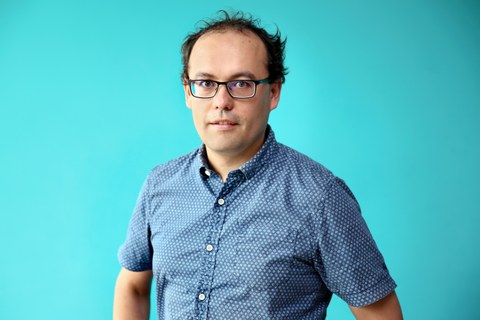May 02, 2023
PROF. DR. THOMAS KÜHNE HOLDS THE PROFESSORSHIP FOR COMPUTATIONAL SYSTEMS SCIENCE
On May 1, Prof. Thomas Kühne takes up his duties as holder of the professorship for Computational Systems Science - a joint appointment with the Helmholtz-Zentrum Dresden-Rossendorf HZDR. He is assigned to the Institute of Artificial Intelligence at the Faculty of Computer Science and will mainly work at CASUS Görlitz.
He completed his computer science (B.Sc.) and diploma studies in computational sciences at the Swiss Federal Institute of Technology (ETH), Zurich, where he also received his PhD in 2008. Thomas Kühne did postdoctoral research in the Department of Physics at Harvard University before taking up the position of Assistant Professor of Theoretical Chemistry at Gutenberg University in Mainz, Germany. As of 2014 he served as Professor of Theoretical Interfacial Chemistry and since 2018 as the Chair of Theoretical Chemistry at the University of Paderborn.
His research interests include the development of novel numerical methods and algorithms for chemical and physical processes and their implementation in the form of computer programs that allow the most efficient solution possible through clever approximations, while at the same time correctly reflecting the chemistry and physics of the original system [1]. These can then be computed using either massively parallel supercomputers, or recently also on quantum computers [2,3]. In particular, the research focuses on aqueous systems such as water interfaces, water in confined geometries, biologically relevant reactions in water solutions, and heterogeneous "on-water" catalysis. In addition, sustainable systems and energy materials, such as CIGS-based thin film solar cells, polymer electrolyte fuel cells, lithium-sulfur batteries, and novel hydrogen storage materials are studied.
He has authored more than 175 peer-reviewed research papers and was awarded an ERC Starting Grant in 2016 for his project on "on-water" catalysis and the University of Paderborn Research Award in 2020 for his work on "GreenIT". He is currently vice-chair of the Paderborn Center for Parallel Computing (PC2) and the recently founded Center for Sustainable Systems Design (CSSD), as well as a member of the DFG Review Board. Moreover, he is co-author of the popular open-source simulation package CP2K [4].
“In the future, I look forward to continuing my research work at the CASUS Institute, which was founded in 2019 and investigates complex systems in the earth and natural sciences as well as biomedicine using data science methods," said Prof. Thomas Kühne. "Together we will create a highly visible center of excellence in the areas of artificial intelligence, as well as data and computational sciences to master the challenges in these systems."
[1] https://wires.onlinelibrary.wiley.com/doi/abs/10.1002/wcms.1176
[2] https://www.sciencedirect.com/science/article/pii/S0167819122000242
[3] https://journals.aps.org/prresearch/abstract/10.1103/PhysRevResearch.4.033160
[4] https://pubs.aip.org/aip/jcp/article/152/19/194103/199081/CP2K-An-electronic-structure-and-molecular

